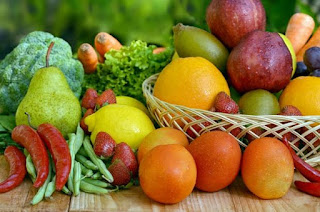Eight a day is clearly best for your heart
http://sciencenordic.com/eight-day-clearly-best-your-heart
You’ve heard it a thousand times, that little catchphrase with the magic number encouraging you to eat “five a day” of fruits and vegetables for better health. But it turns out that the real magic number is eight, according to a new comprehensive study.The study, published in the International Journal of Epidemiology, spearheaded by Dagfinn Aune from NTNU and Imperial College London, shows that 7.8 million deaths worldwide could be prevented each year if people ate more fruits and vegetables. Aune says the more you eat, the lower the overall risk of heart disease, stroke, cancer and premature death.
“The results support recommendations to increase the amount of fruits and vegetables people eat,” said Aune.
The study shows that the risk of dying prematurely from all causes was reduced by almost a third, and the risk of cardiovascular disease by about a quarter in people who ate 800 grams of fruit and vegetables every day, compared with those who ate very little or no fruits and vegetables.
“We see a gradual reduction in risk with increasing consumption, so a low or moderate intake is better than not eating fruits and vegetables at all,” he said.
Apples and pears, citrus fruit, fruit juice, green leafy vegetables and fruits and vegetables rich in vitamin C were among the types of fruit and vegetables that were linked to a reduced risk of cardiovascular disease and premature death.
Canned fruits, however, were linked to increased risk of cardiovascular disease and premature death.
“However, we need more studies on specific types of fruit and vegetables because relatively few of the studies in our analysis had looked at this issue,” said Aune.
Fruits and vegetables contain fibre, vitamin C, antioxidants, potassium and flavonoids, all of which have been directly linked to good health. A high intake of fibre can help lower cholesterol, blood pressure and inflammation in the body, improve blood vessel function and prevent people from becoming overweight and obese.
Antioxidants can prevent free radicals and other reactive oxygen species from damaging the body’s genetic material. Fruits and vegetables can also have a positive effect on bacteria in the intestines.
“Supplementing with antioxidants and vitamins does not have the same beneficial effects, so probably it’s the whole package of beneficial substances that you get from eating fruits and vegetables that acts synergistically,” said Aune, who was recently awarded his doctorate from NTNU. He is now an associate professor at Bjørknes University College in Oslo."
Canned fruits, however, were linked to increased risk of cardiovascular disease and premature death.
“However, we need more studies on specific types of fruit and vegetables because relatively few of the studies in our analysis had looked at this issue,” said Aune.
Fruits and vegetables contain fibre, vitamin C, antioxidants, potassium and flavonoids, all of which have been directly linked to good health. A high intake of fibre can help lower cholesterol, blood pressure and inflammation in the body, improve blood vessel function and prevent people from becoming overweight and obese.
Antioxidants can prevent free radicals and other reactive oxygen species from damaging the body’s genetic material. Fruits and vegetables can also have a positive effect on bacteria in the intestines.
“Supplementing with antioxidants and vitamins does not have the same beneficial effects, so probably it’s the whole package of beneficial substances that you get from eating fruits and vegetables that acts synergistically,” said Aune, who was recently awarded his doctorate from NTNU. He is now an associate professor at Bjørknes University College in Oslo."
My comment: Life is not driven by genes. Genes are driven by lifestyle. Diseases like cardiovascular diseases, cancers, strokes etc. are linked to genetic mutations. The actual reason for mutations can be found in epigenetic factors. Diet is the most significant driver of our epigenome. Inbalance in the epigenome leads to sequence changes. Sequence changes lead to faulty genes. Faulty genes lead to chromosome loss.
There are about 200,000 disease-causing genetic mutations in the human DNA. The basic tenets of the Evolutionary theory are seriously wrong. We understand that mutations don't occur randomly and natural selection is not able to filter them out. There are no beneficial random mutations.
Everything points to Intelligent Design and Creation. Don't get lost.
There are about 200,000 disease-causing genetic mutations in the human DNA. The basic tenets of the Evolutionary theory are seriously wrong. We understand that mutations don't occur randomly and natural selection is not able to filter them out. There are no beneficial random mutations.
Everything points to Intelligent Design and Creation. Don't get lost.
